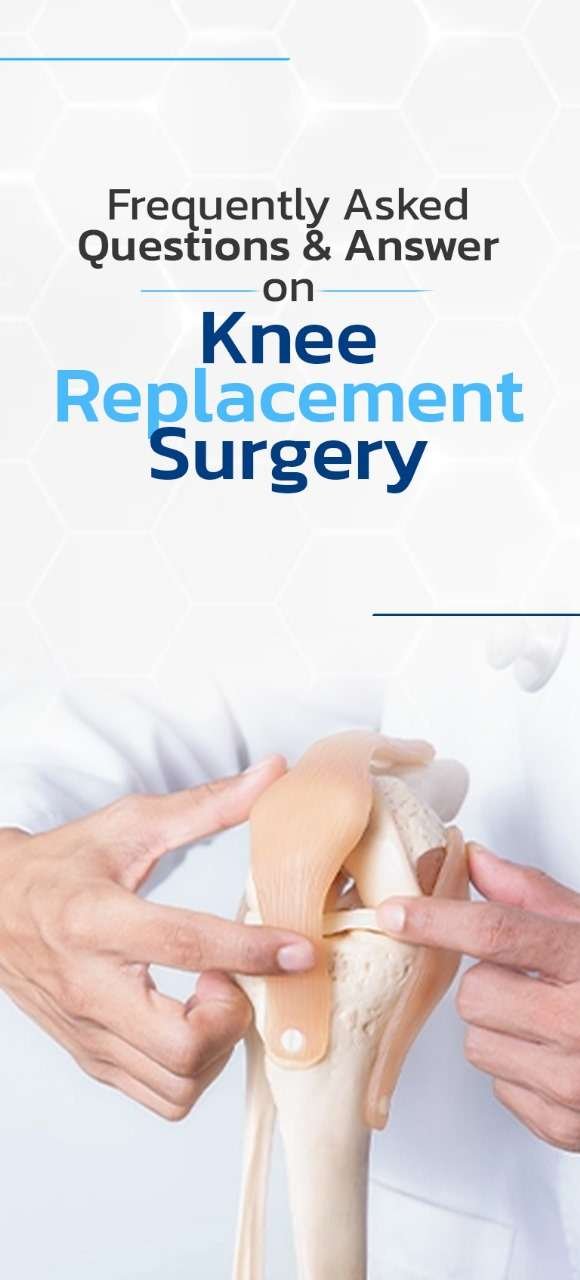

Considering knee replacement surgery? Here are some frequently asked questions by patients and their relatives. These 15 questions will provide you with insight before undergoing the procedure. Check if any of these address your concerns:
Knee replacement surgery, also known as knee arthroplasty, is a procedure to replace the weight-bearing surfaces of the knee joint to relieve pain and disability, often due to arthritis or other knee diseases. This surgery involves replacing the damaged or diseased parts of the knee joint with artificial components made of metal and plastic to replicate the knee’s natural movement.
The surgery is performed under general or spinal anaesthesia. The surgeon makes an incision in the knee to access the joint. Damaged portions of the femur (thigh bone) and tibia (shin bone) are removed and replaced with artificial components. The underside of the kneecap (patella) may also be resurfaced. The artificial components are then fixed into place, and the incision is closed.
Mini Invasive Surgery is when the muscles around the joint are NOT CUT. This approach doesn’t incite the inflammation as much as the conventional technique. Hence the surgery is painless, recovery is quick and most patients begin walking within 3 to 6 hours after surgery, start stairs climbing on the next day.
Yes, most patients are able to climb stairs after knee replacement surgery. Initially, you might need assistance or a handrail, but as you recover and gain strength and flexibility, stair climbing becomes easier.
There’s no universal “best” age for knee replacement surgery. The decision is based on the patient’s pain and disability, not age. However, it’s typically recommended for patients aged 50 to 80, as younger patients may wear out their artificial knee and require a revision surgery.
Patients are encouraged to start walking with assistance as early as the day of or the day after surgery. Independent walking can usually begin within 4-5 days post-surgery, depending on the individual’s recovery.
Yes, many patients return to a normal, active lifestyle after recovery. While high-impact activities may be restricted, most forms of exercise and daily activities can be resumed.
The disadvantages include the risks of surgery such as infection, blood clots, implant failure, and the need for revision surgery in the future. Recovery can also be lengthy and may require extensive physical therapy.
Use a raised toilet seat or a toilet safety frame. When sitting down, back up to the toilet, use the arms of the safety frame or the sides of the toilet for support, and lower yourself slowly. Reverse the process when standing up.
Most artificial knee joints last 15 to 20 years, depending on the patient’s activity level and weight, among other factors. The Gold Plated Knee Implant last up to 40 years.
Delaying surgery can lead to worsening pain, decreased function, and potentially more complex surgery later due to further deterioration of the knee joint.
There’s no maximum weight for surgery, but higher weight increases the risk of complications. Surgeons may recommend weight loss before surgery to improve outcomes.
Yes, knee replacement is considered a major surgery due to the incisions and alterations made to the bones and tissues of the knee. However, it’s also a common and generally safe procedure.
The most common complaints include pain during the recovery period, limited range of motion initially, and the time it takes to return to normal activities.
Patients can typically resume driving when they can bend their knee sufficiently to enter and sit comfortably in a car, and once they are off strong pain medications. This is usually around 4 to 6 weeks after surgery, but it can vary.
Knee replacement surgery is a transformative option for individuals with knee issues, offering improved mobility and quality of life. With advancements in technology and techniques, it provides significant relief from pain and restores function. Despite the need for careful consideration, its role in modern orthopaedic care is undeniable, promising enhanced well-being and mobility for many.
WhatsApp us